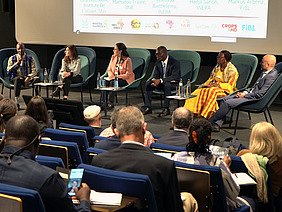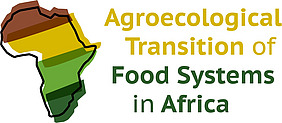Building on this collaborative spirit, the conference featured contributions from nine research projects funded by the EU's research programme Horizon 2020, the DeSIRA initiative (Development Smart Innovation through Research in Agriculture), and the Swiss Agency for Development and Cooperation (SDC). These projects included EWA-BELT, FairSahel, HealthyFoodAfrica, Soils4Africa, SustainSAHEL, SustInAfrica, SysCom, CROPS4HD, and UPSCALE. Each project shared cutting-edge scientific evidence and practical insights from diverse agroecological initiatives across the African continent.
The event opened with two keynote speeches that set a powerful tone for the day. Beate Huber (Vice-chairwoman of the Management Board and Head of the Department of International Cooperation at FiBL Switzerland) and Abebe Haile-Gabriel (Assistant Director-General and Regional Representative for Africa at the Food and Agriculture Organisation of the United Nations FAO) shared strategic insights on the role of agroecology in tackling urgent food system challenges. The rest of the conference was guided by the two moderators Markus Arbenz (FiBL) and Mila Sell (University of Helsinki), who facilitated engaging panel discussions and fostered dynamic exchanges between panellists and the audience.
Diverse discussions
Throughout the day, participants engaged in dynamic sessions that tackled key themes such as:
- Climate-resilient production systems
- Agrobiodiversity strategies for nutrition and food security
- Inclusive growth and sustainable job creation
- Agroecological transition and adoption
- EU-Africa research and innovation priorities for resilient livelihoods
These discussions underscored the strong momentum behind agroecology, highlighting its ability to strengthen climate resilience, enhance food diversity, and stimulate local economies.
Policy briefing with recommendations
To support the conference outcomes, FiBL Europe compiled a conference briefing summarizing key findings and recommendations from the nine featured projects. The document positions agroecology and organic farming as scalable solutions to climate and food security challenges – with the potential to restore ecosystems, improve productivity, and support inclusive development. It calls for greater investment and policy support to scale up agroecological practices across Africa for long-term environmental, social, and economic impacts.
A summary of the conference and inspiring interviews with participants are available in video form on YouTube.
Further information
Contacts
- Harun Cicek, FiBL Switzerland
- Carla Pinho, FiBL Europe
- Selene Capalbo, FiBL Europe
Links and downloads
- conference.sustainsahel.net: Conference briefing
- conference.sustainsahel.net: Programme and speakers biographies
- conference.sustainsahel.net: Conference website
- youtube.com: Review video





